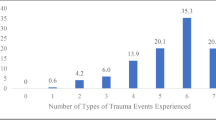Abstract
Individuals with histories of violence, abuse, and neglect from childhood onward make up the majority of clients served by public mental health and substance abuse service systems. The greater the trauma, the greater the risk for alcoholism and alcohol abuse, depression, illicit drug use, suicide attempts, and other negative outcomes. Clearly, we cannot begin to address the totality of an individual’s healthcare, or focus on promoting health and preventing disease, unless we address trauma. Trauma-informed care is now the expectation, not the exception, in behavioral health treatment systems.
Similar content being viewed by others
References
Goodman L, Rosenberg S, Mueser K, et al. Physical and sexual assault history in women with serious mental illness: Prevalence, correlates, treatment, and future research directions. Schizophrenia Bulletin. 1997;23:685–696.
Substance Abuse and Mental Health Services Administration (SAMHSA), Center for Substance Abuse Treatment (CSAT). Substance abuse treatment for persons with child abuse and neglect issues. Treatment improvement protocol (TIP) series. 2000; Number 36. DHHS Publication No. (SMA) 00–335. Washington DC: U.S. Printing Office.
Centers for Disease Control and Prevention. Adverse Childhood Experiences (ACE) Study, Major Findings. Accessed at http://www.cdc.gov/ace/findings.htm on July 21, 2011.
Felitti VJ, Anda RF, Norenberg D, et al. Relationship of childhood abuse and household dysfunction to many of the leading causes of death in adults: the adverse childhood experiences (ACE) study. American Journal of Preventive Medicine 1998;14:245–258.
The Economic Costs of Drug Abuse in the United States 1992–1998. Report prepared by The Lewin Group.
Center for Mental Health Services National Center for Trauma Informed Care. Models for Developing Trauma-Informed Behavioral Health Systems and Trauma-Specific Services, 2008 Update. Accessed at http://www.annafoundation.org/Models%20for%20Developing%20Traums-Report%201-09-09%20_FINAL_.pdf on July 21, 2011.
Press Releases: The National Council Selects 21 Organizations to Participate in Trauma-informed Practices Learning Community. Accessed at http://www.thenationalcouncil.org/cs/the_national_council_selects_21_organizations_to_participate_in_traumainformed_practices_learning_community on July 21, 2011.
Author information
Authors and Affiliations
Corresponding author
Rights and permissions
About this article
Cite this article
Rosenberg, L. Addressing Trauma in Mental Health and Substance Use Treatment. J Behav Health Serv Res 38, 428–431 (2011). https://doi.org/10.1007/s11414-011-9256-9
Published:
Issue Date:
DOI: https://doi.org/10.1007/s11414-011-9256-9




